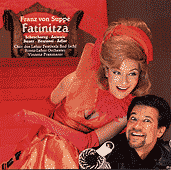 Fatinitza
Fatinitza
Operetta in 3 acts. Libretto: Friedrich Zell and Richard Genée
Carl-Theater, Vienna - 5th January, 1876.
Synopsis
The members of the cadet corps are enjoying a snowball fight whilst drinking vodka provided by the undercover agent Wuika. Their antics awaken Lieutenant Vladimir who has just been dreaming about Lydia Uschakoff, the woman he loves. In order to discourage Vladimir from courting her, General Kantschukoff, her uncle, has transferred Vladimir to serve here at Isaktscha in the infantry.
Enter Vladimir's friend, Julian von Goltz, a war correspondent, who relates that Vladimir once disguised himself as a beautiful Czerkess lady, Fatinitza, in order to have an erotic liaison. He was saved by General Kantschukoff, who not knowing that Vladimir was playing a role, fell madly in love with the lady imposter. Just for fun, Vladimir repeats the joke and dresses up as Fatinitza when Kantschukoff appears who raves that he has rediscovered his beloved Fatinitza.
Lydia also visits the camp and the uncanny resemblance between Fatinitza and Vladimir strikes her. Fatinitza claims that Vladimir is her twin brother! When night falls the Turkish governor, Izzet Pascha, attacks the camp and abducts the true and the false lady, carrying them off to his castle. The general is furious.
The ladies of the harem are expecting their master, who declares himself to be a reformed Turk, whenever it serves his intentions and plans. Lydia has become the governor's new favourite. Vladimir/Fatinitza, who claims to be Lydia's maid, has meanwhile revealed his true identity to Lydia. Julian works as a double agent and negotiates a ransom to set the two ladies free. In addition, he is about to stage a performance of Mozart's Il Seraglio.
The farce ends up as a presentation of an ancient Turkish shadow play called Karagois, an expression for silhouettes. General Kantschukoff has finally made his way into the harem and wants to bring Lydia and Fatinitza back to the Russian quarters. But Fatinitza has mysteriously disappeared; rumour has it that she was kidnapped. However, the general frees all the women in the harem who praise him as their saviour.
With the war over, the general desperately searches for Fatinitza. Lydia is must marry an old prince. Julian in cahoots with Wuikact as matchmakers. Vladimir introduces himself to the general as Fatinitza's caring brother. At long last, Kantschukoff consents to the marriage between Vladimir and Lydia.
In a theatrical farce, a girl, presented as Fatinitza, turns out to be coloured. The general is extremely frustrated when he hears from Julian that the real Fatinitza has already died. His only consolation is a letter in which Fatinitza confesses her undying love for the naive man.
adapted from a translation by Andrea Huber/Michael Lakner
Scenes and settings
Place and time: near the castle of lsaktscha in Odessa during the Crimean war between Russia and Turkey 1854/1855
- Act I: The Russian military quarters on the Danube
- Act II. Inside lzzet Pascha's palace
- Act III. The palace of General Kantschukoff in Odessa
Musical Numbers
Act 1
- Praeludio
- Introduction: Halt, wer da? (Wache)
- Entrée des Marketenders Wutki, wenn die Flasche leer! (Wuika)
- Traumlied: Erwache frei von allem Kummer (Kadetten & Chor)
- Reporter Lied: Was gibt's da? (Wladimir)
- Abgang der Cadetten: Aber deswegen niemais verlegen (Julian)
- Entrée des Generals: Himmel, Bomben, Element! (Kantschukoff)
- Duettino: Wollen Sie mich lieben (Wladimir/Kantschukoff)
- Abmarsch: Liegt der Schnee so weiß (Chor)
- Schlitten-Arie: Eurer Onkel (Lydia)
- Quartett: Eine Zuflucht winket Dir (Kantschukoff/Lydia/Vladimir/Julian)
- Finale Akt I - Nur hem Geschrei (Chor)
Akt 2
- Toilette Chor: Den Gebieter zu entzucken (4 Soli & 4 Sklavinnen)
- Couplet: Reformen tun Not bei der kirkischen Nation (Izzet)
- Melodram - Kurzer Musiksatz
- Abgang Izzet's (Refrain des Couplets) Ein bissel auffrischen (Izzet, Nursidah, Besika, Diona, Suleika)
- Duett: Mein Herz, es zagt (Wladimir/Lydia)
- Sextett: Bin ich selbst (Wladimir/Lydia/Nursidah/Besika/Zuleika/Diona)
- Kismet-Duettino: leder Trinker ist anfangs nuchtern (Izzet/Julian)
- Glocken-Sextett: Silberglackchen rufen helle (Nursidah/Julian/Izzet/Diona/Zuleika/Besika)
- Finale Akt II Und nun zum Karagois! (Izzet)
- Fatinitza Marsch
Akt 3
- Glocken-Arie: Glockentane kunden Frieden (Lydia)
- Brief-Duettino: Urn Fatinitzds Spur zu finden (Julian/Kantschukoff)
- Terzett: Dich wieder zu seh'n (Wladimir/Lydia/Julian)
- Einzug and Finale III: Willkommenf Hier steht die Braut (Kantschukoff)
Cast of Characters
- Wladimir Samoiloff, Leutnant eines tscherkessischen Reiterregiments (lyrical Mezzo-soprano)
- General Timosey Kantschukoff, russischer General (Baritone)
- Izzet Pascha, Gouverneur der türkischen Festung lsaktscha (Bass baritone)
- Fürstin Lydia Uschakoff, dessen Nichte (Soprano)
- Julian von Goltz, Berichterstatter einer großen deutschen Zeitschrift (Tenor)
- Hassan Bey, Führer einer Schar Baschi-Bozuks (Schauspieler)
- Mustapha
- Haremswächter
- Massaldschi
- ein Pope
- Wuika, ein Bulgare
- Nursidah (Soprano)
- Zuleika (Mezzo-soprano)
- Diona (Mezzo-soprano)
- Besika (Soprano)
- Steiparm Sidorewitsch Bieloscurim, Sergant (Schauspieler)
- Osipp Wasielowitsch Safonoff, Leutnant (Bass)